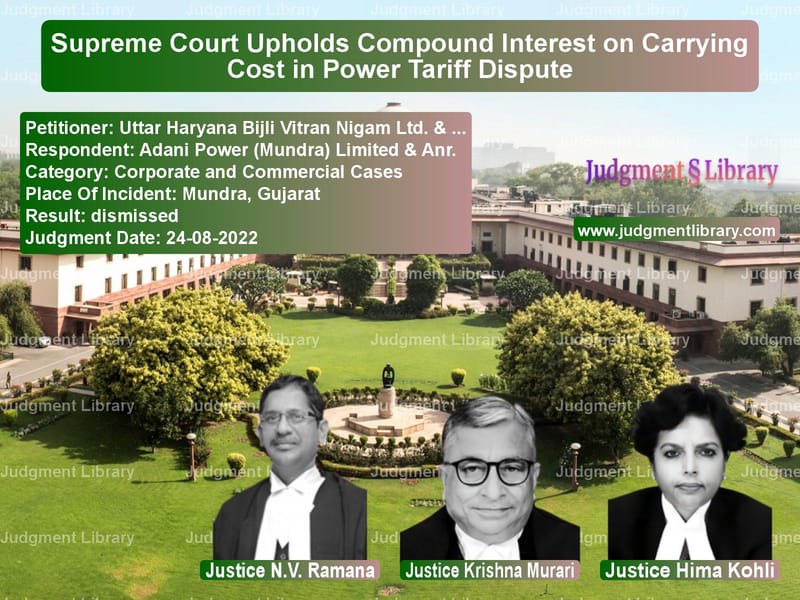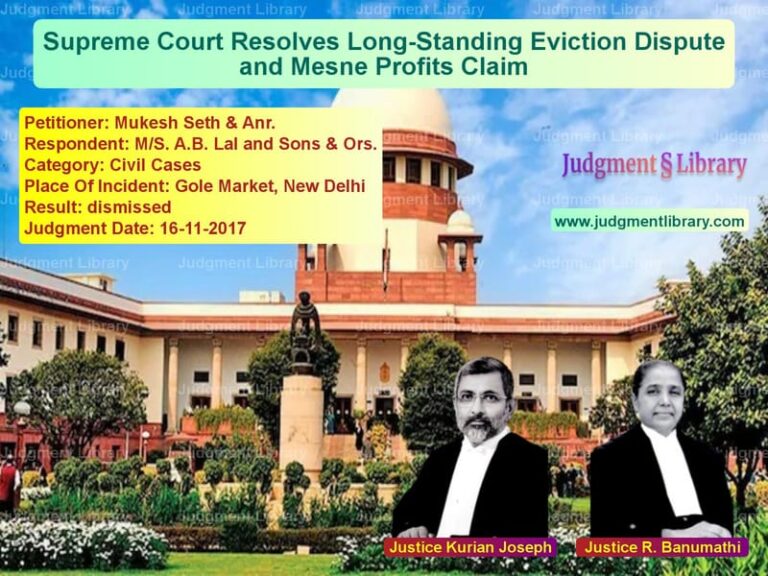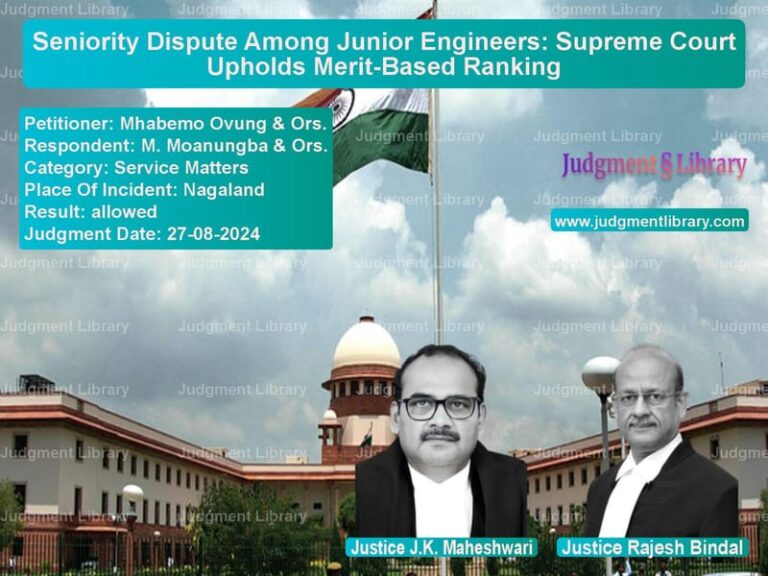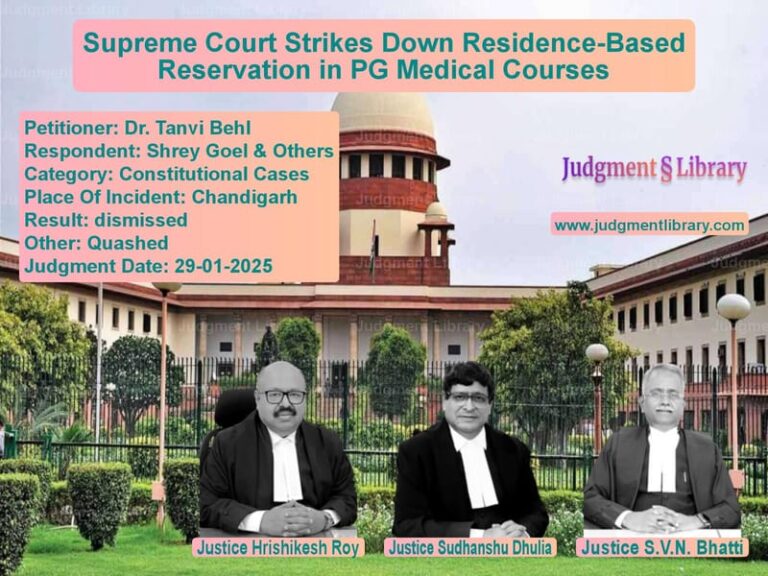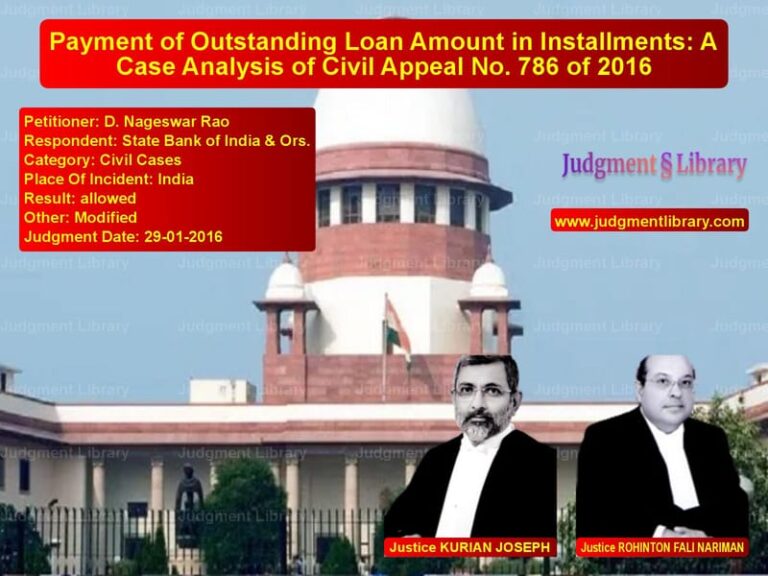Supreme Court Upholds Compound Interest on Carrying Cost in Power Tariff Dispute
The case of Uttar Haryana Bijli Vitran Nigam Ltd. & Anr. vs. Adani Power (Mundra) Limited & Anr. revolved around a dispute concerning the payment of carrying cost with interest, including compound interest, for changes in law affecting power purchase agreements (PPAs). The Supreme Court was called upon to decide whether Adani Power was entitled to compound interest on carrying cost for expenses incurred due to changes in law.
Background of the Case
Adani Power (Mundra) Limited set up a 4620 MW coal-fired power plant in Mundra, Gujarat, and entered into two PPAs on August 7, 2008, with the appellants, Uttar Haryana Bijli Vitran Nigam Ltd. & Anr., to supply 1424 MW of power.
In 2010, the Ministry of Environment and Forests, Government of India, issued an environmental clearance that required Adani Power to install a Flue Gas Desulfurization (FGD) unit, leading to an increase in project costs. Adani Power subsequently filed a petition before the Central Electricity Regulatory Commission (CERC) seeking compensation for the additional expenditure due to this “Change in Law” event.
In an order dated February 6, 2017, CERC allowed compensation for certain change-in-law events but denied carrying cost. Adani Power then appealed to the Appellate Tribunal for Electricity (APTEL), which ruled in its favor, allowing carrying cost with compound interest.
Aggrieved by the decision, Uttar Haryana Bijli Vitran Nigam Ltd. & Anr. challenged the ruling before the Supreme Court, arguing that only simple interest should be payable and not compound interest.
Key Legal Questions
The Supreme Court had to decide:
- Whether Adani Power was entitled to carrying cost for the additional expenses incurred due to the change in law.
- Whether the power distribution companies (discoms) should pay compound interest on the carrying cost or only simple interest.
- Whether restitution principles under the PPA justified the claim for compound interest.
Arguments Presented
Petitioner (Uttar Haryana Bijli Vitran Nigam Ltd. & Anr.) Arguments
- The appellants contended that carrying cost should only attract simple interest, as there was no explicit provision in the PPAs allowing compound interest.
- They argued that the delay in determining the amount payable was not their fault and that compound interest would lead to an unjust financial burden.
- They asserted that under the Electricity Act, 2003, there was no statutory provision mandating the payment of compound interest on carrying cost.
Respondent (Adani Power) Arguments
- Adani Power argued that carrying cost with compound interest was justified under the restitution principles enshrined in the PPAs.
- They contended that they had to borrow funds at commercial interest rates to comply with the environmental mandate and that allowing only simple interest would not adequately compensate them.
- They cited Reserve Bank of India Circulars that require interest on advances to be compounded, arguing that since they had paid compound interest on loans, they should be reimbursed on the same basis.
Supreme Court’s Analysis and Judgment
The Supreme Court reviewed the PPAs and relevant legal precedents to determine whether carrying cost should be compounded or remain simple interest.
Key Observations by the Supreme Court
- The Court upheld the restitutionary principle under Article 13 of the PPAs, which aims to compensate the affected party for losses due to a change in law.
- It ruled that carrying cost was payable from the date of the change-in-law event (January 29, 2014) until the actual payment was made.
- The Court found that since Adani Power had taken loans to cover the additional expenditure, it was justified in seeking compound interest.
- The judgment emphasized that denying compound interest would defeat the purpose of full restitution.
Key Court Statement
“The idea behind granting interest on carrying cost is not far to see; it is aimed at restituting a party that is adversely affected by a Change in Law event and restoring it to its original economic position as if such a Change in Law event had not taken place.”
Final Judgment
- The Supreme Court upheld the Appellate Tribunal’s decision allowing compound interest on carrying cost.
- It ruled that Adani Power was entitled to compound interest from the date of the change-in-law event.
- The appeal filed by Uttar Haryana Bijli Vitran Nigam Ltd. & Anr. was dismissed.
Implications of the Judgment
This ruling has significant implications for power purchase agreements and regulatory disputes in the energy sector:
- It establishes that compound interest on carrying cost is valid when a power generator incurs additional costs due to a regulatory change.
- It reinforces that restitution principles apply to power purchase agreements and should be interpreted in favor of the affected party.
- It prevents discoms from delaying payments and ensures that power companies receive fair compensation for regulatory compliance costs.
- It creates a precedent for similar disputes in the energy sector, impacting how future PPAs are structured.
Conclusion
The Supreme Court’s decision in this case sets a vital precedent for contractual disputes in the power sector. By upholding compound interest on carrying cost, the Court has ensured that power generating companies are fully compensated for expenses incurred due to regulatory changes. The judgment reaffirms the principle that affected parties must be restored to their original economic position, preventing financial losses due to delayed payments. This ruling will significantly impact future power purchase agreements and reinforce contractual fairness in the industry.
Petitioner Name: Uttar Haryana Bijli Vitran Nigam Ltd. & Anr..Respondent Name: Adani Power (Mundra) Limited & Anr..Judgment By: Justice N.V. Ramana, Justice Krishna Murari, Justice Hima Kohli.Place Of Incident: Mundra, Gujarat.Judgment Date: 24-08-2022.
Don’t miss out on the full details! Download the complete judgment in PDF format below and gain valuable insights instantly!
Download Judgment: uttar-haryana-bijli-vs-adani-power-(mundra)-supreme-court-of-india-judgment-dated-24-08-2022.pdf
Directly Download Judgment: Directly download this Judgment
See all petitions in Corporate Compliance
See all petitions in Company Law
See all petitions in Bankruptcy and Insolvency
See all petitions in unfair trade practices
See all petitions in Judgment by N.V. Ramana
See all petitions in Judgment by Krishna Murari
See all petitions in Judgment by Hima Kohli
See all petitions in dismissed
See all petitions in supreme court of India judgments August 2022
See all petitions in 2022 judgments
See all posts in Corporate and Commercial Cases Category
See all allowed petitions in Corporate and Commercial Cases Category
See all Dismissed petitions in Corporate and Commercial Cases Category
See all partially allowed petitions in Corporate and Commercial Cases Category

